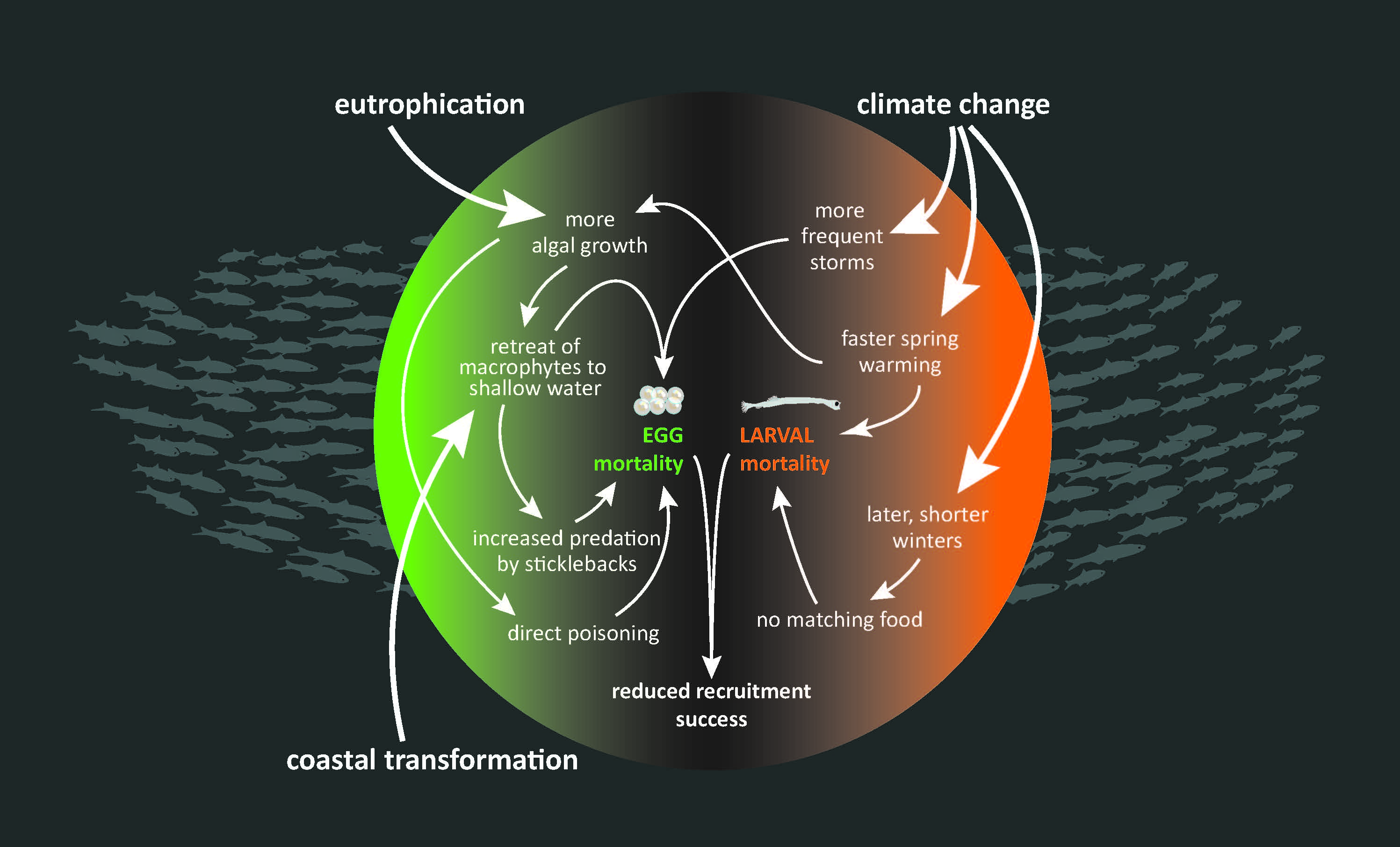In this feature article, Christopher Zimmermann explains how climate change impacts herring productivity and what he and fellow researchers at Thünen Institute of Baltic Sea Fisheries, Germany, have done over the last 15 years to discover this.
Western Baltic herring, one of the most important resources for small scale fisheries in the region, have been producing less and less offspring since about 2004. The Thünen Institute of Baltic Sea Fisheries investigated the causes over the course of the last 15 years, and now produced a web-based multimedia feature to illustrate the results of this research.
Stock assessments, conducted by the Herring Assessment Working Group for the Area South of 62ºN (HAWG), have had to be revised downwards for a number of years as the stock is now far smaller than the limit reference point. Since 2019, ICES has recommended to close all fisheries exploiting the stock.
Why is recruitment declining?
As ecologists, we are not only interested in reporting the effect this has on the fishing opportunities forecast but also in the reasons for the recruitment decline. To investigate, we used one of the longest time-series available for the early life history of a commercially exploited fish stock - the Rügen herring larvae survey. Since 1977, this survey has been conducted by Thünen Institute and its predecessors on the main spawning ground of Western Baltic herring, the Greifswalder Bodden and Strelasund (also featured in ICES Eggs and larvae survey database).
Our research was mostly funded by the EU Data Collection Framework and the Federal Government but also from various other sources such as national stipends. We involved Masters and PhD students from various universities and developed a number of different hypothesis, testing them thoroughly over the course of 15 years. As usual in science, we had to decline most of them.
Has the number of predators increased? Has prey for the larvae reduced? Do storms wash spawn onshore? Are the larvae flushed out of the Bodden?
Are increased nutrient loads the cause? Are there too few aquatic plants?
In spring 2021, we were finally able to publish a consistent hypothesis and lots of evidence: It is mainly the warmer and later winters that lead to the reduction of recruitment.
Our paper, "Reduced Reproductive Success of Western Baltic Herring (Clupea harengus) as a Response to Warming Winters", sparked the production of a modern web-based multimedia feature that could target a wider audience (available in both German and English). The multi-media project team comprised Nadine Kraft, science writer, Patrick Polte, principal scientist of the Rügen herring larvae survey and co-chair of the Working Group on Atlantic Fish Larvae and Eggs Surveys (WGALES), Anne Schütz, media designer, and Christopher Zimmermann, director of Thünen Institute of Baltic Sea Fisheries and Advice Committee (ACOM) member for Germany.
What does this mean for Western Baltic herring?
With the online project, we explain the significance of herring for local coastal fisheries, how we approached the problem, and what we learned through the long process. This is one of the first cases where the impact of climate change on the productivity of a coastal fish stock has been proven, with detrimental effects for the fishery now, not in 20 or 30 years when the Paris target is missed: the productivity of the stock has probably halved compared to the 1990s.
Using the knowledge we gained, we also share observed or expected impacts of warming sea temperatures elsewhere, in the tropics and Polar regions. And finally, we propose ways for the stock to recover; ICES calculations demonstrate that with a significant reduction of fishing, the stock will be able to recover within a few years in spite of continued poor recruitment.
However, even if recovered, productivity will be reduced by half, as will the catches that can be taken sustainably. Reducing stressors other than temperature, such as eutrophication, might help the stock to gain part of its historic productivity. We explain how these stressors might affect recruitment.

Click to enlarge: Image Christopher Zimmermann, Thünen Institute.
Better communication
Production of the feature helped our communication with the press and a wider public enormously. It was also a good occasion to align our argumentation internally and to establish links to other organizations, it forced us to produce a number of high-quality infographics on the topic and search for photographs to illustrate the feature. We found most of the latter in the fundus of our own Thünen employees. The five weeks of development were a great investment as the project now serves as an example for similar features in other Thünen institutes (one example is explaining the importance of sustainable forest use to counter global change).
You can view Thünen Explains: herring trapped in climate change now in both German and English.

